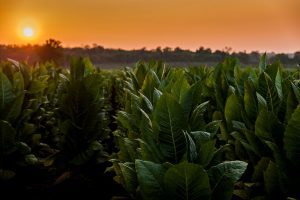It was my second day at the Virginia General Assembly, there on behalf of the Virginia Agribusiness Council. People buzzed by, waiting outside of offices hoping to get a word with their elected officials and sitting in subcommittee meetings. I was, and am still in some ways, speechless as I tried not to get lost in the crowd.
Part of me screamed on the inside wanting to escape this zoo. I thought of the farmhouse back in Blackstone, sitting on the back porch below magnolia trees and a sky full of stars, listening to the cows mooing in the distance. I wanted to be riding backroads in a pickup truck passing by fields — I was a fish out of water here at the Capitol in Richmond.
I listened to legislators debating bills, asking questions, searching for understanding on issues that they simply were unfamiliar with. In the ag subcommittee, I wondered how many of these legislators had actually stepped foot on a farm. I wanted to ask who of them have had a conversation with a producer, have cared to see how they were doing, have thought about how the food gets on their plate every day. I have to remind myself that these individuals do this with a servant’s heart, with a career and life outside of this crazy world and therefore cannot possibly understand some of the implications that these conversations and bills have. And yet, here they are, with good intentions, but a huge disconnect.
However, there is a lot of power that can be enacted in a short amount of time without fully understanding the ripple effect. The legislative session is shorter than the time it takes to plan a wedding. We can put food on the table, but if we’re not there to fight for a seat, we would easily be forgotten.
I looked at my boss and our other friends representing agricultural and forestry entities, saving each other seats and protecting our common interest. They would be at the Capitol until at least 9 p.m. They would go home to read bills just to be back at the crack of dawn the next morning to sit and wait in more meetings, track down more legislators and their aides, and analyze every word choice in the bills in front of us. It’s not the kind of back-breaking, sweat-inducing hard work that most of us are used to, but it was hard work.
My boss had a seemingly endless task in front of him; I, on the other hand, just wanted to get out of the city. There were bills trying to ban pesticides, regulate storage tanks, unfairly mandate farm practices without providing technical assistance, stop teens from working in a tobacco field, and create 15 to 45 minute breaks for every hour worked in the heat. I guess they’ve never tried to plant potatoes or pull tobacco in the summertime while watching the weather.

Too often, if you’re not part of or from agriculture in some way, you don’t truly see ag until there isn’t food in front of you. You don’t think about these families, these agronomists, these foresters, these producers who are connected to every part of life — from our cotton sheets and the paper we used through school to the food on the table that provides us the energy to make it through the day. It’s heartbreaking really, the surrounding world that they miss out on. But on the eighth day, God didn’t make everyone a farmer.
This is why we tell the story, our story. When I got the offer to work for the Virginia Agribusiness Council, I knew it was a dream job because I wanted to help be a bridge, a voice, a microphone for all that I love about agriculture and forestry. However, I was unfamiliar with the political world and its ripples in our industry. This is why I am grateful that there are people like the council, Farm Bureau, and the many other groups we work with, to tell this beautifully woven story of the people who feed, clothe, and steward the world. Whether it’s taking legislators on farm tours and enabling that conversation or it’s running around the crazy zoo of the General Assembly to protect our seat at the table, they are here so those of us who would rather be on the farm can do what we’re best at.
Because “I learned this from a documentary” is a sorry excuse for a bill.
Sarah Jane was raised as the forester’s daughter in Southwest Virginia, where she found her voice around the family dinner table. She worked on farms during college while she earned a degree from the University of Georgia in Animal and Dairy Science and a Master’s at Virginia Tech in Agronomy before accepting a dream job with the Virginia Agribusiness Council in Member Services and Events.



